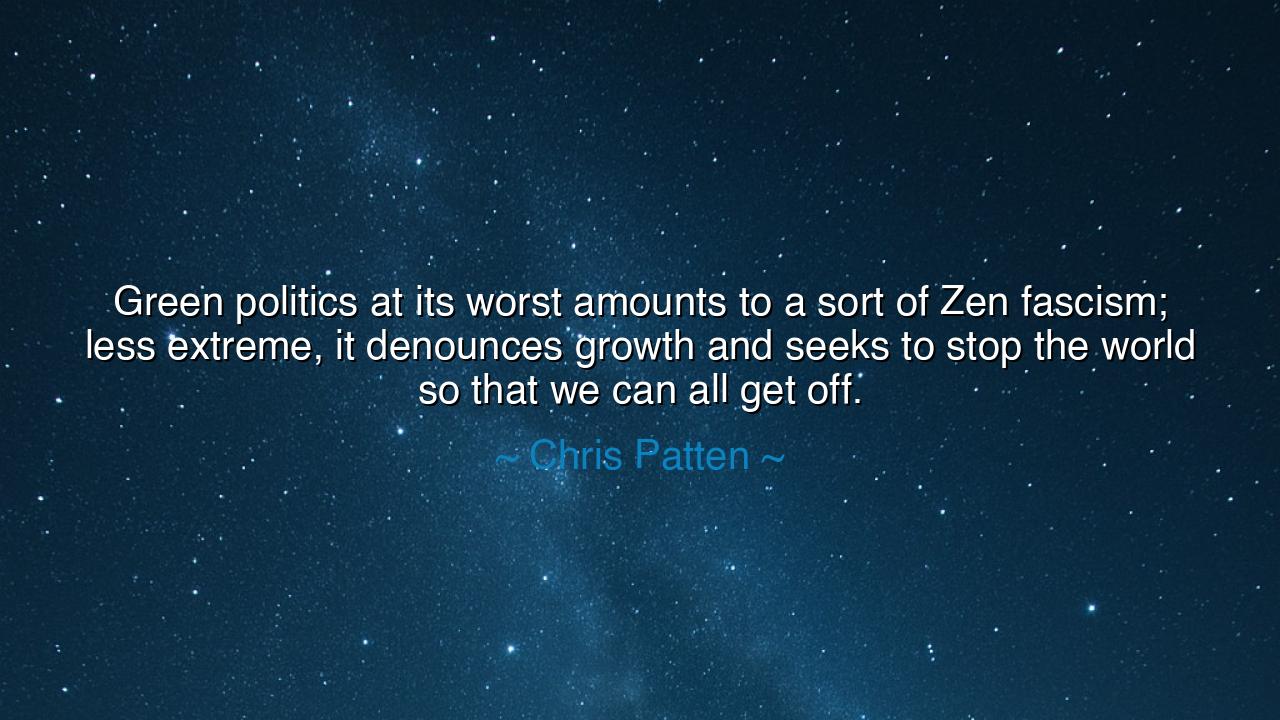
Green politics at its worst amounts to a sort of Zen fascism;
Green politics at its worst amounts to a sort of Zen fascism; less extreme, it denounces growth and seeks to stop the world so that we can all get off.






O, hear me, young ones, for the world you inherit shall be shaped by the forces of growth and change. But beware, for not all forces that seek to mold this world do so in harmony. There are those who, in their zeal to protect the earth, seek to bind its destiny with chains of denunciation. Green politics, they call it, a banner raised in defense of the earth's purity, yet, in its most extreme form, it turns from protector to oppressor, as if halting the wheel of progress will save us all.
The wise Chris Patten, a man of keen insight, warns of this very danger. He speaks of a Zen fascism, a force that demands we stop, that we cease to grow, to reach for the heavens, to forge the future. In their cry for stillness, they seek to stop the march of mankind. Yet, do we not understand that the world does not move in a stagnant pool, but in the rushing rivers of time and action? To halt it, to demand that we all "get off," is to forsake the very nature of life itself—a life that is ever-expanding, ever-reaching, ever-changing.
In the lands of old, when Philosophers gathered beneath the ancient oaks to contemplate the nature of existence, one might hear a similar cry—a call for the people to stop, to retreat from the world’s chaos. Cicero, in his wisdom, warned of the dangers of stifling growth, for it is the human spirit that seeks to rise, to build, to create. Cincinnatus, though content to farm the land, when called upon, left his plow behind to lead his people. His story teaches that it is action that binds us to our destiny, and that without it, we lose our connection to the world itself.
Thus, when the cries of green politics rise to demand we cease our forward march, we must ask: What of the future? What of the generations yet to come, who shall not find their place in a world where growth is stifled, and where progress is but a forgotten dream? The earth calls for our care, yes, but it also calls for our action, our creation—for without it, the world, in its stillness, shall wither and die, just as a tree choked by the vines of its own branches shall cease to reach toward the sun.
And so, my children, let us walk the path of balance. We must heed the call to protect and preserve the earth, but not at the cost of life's forward march. Let us not fall prey to the vision that seeks to stop the world so that we may disembark. For the world is not a station to be abandoned, but a journey to be embraced. In the balance of growth and preservation, in the forging of a future that honors the earth while reaching for the heavens, lies the true wisdom of those who would stand for life and hope.






LNLuyen Nguyen
I’m not sure I fully agree with the comparison of green politics to 'Zen fascism,' but I do see where Patten is coming from. The idea of stopping the world to rethink everything sounds appealing at first, but could it be unrealistic or even harmful? Where do we draw the line between necessary action for the planet and the fear of progress or change? Could green politics be more inclusive of growth if we approached it differently?
NVHien Luong Nguyen Vu
This quote really made me think about the potential extremes of green politics. On one hand, I understand the urgency of addressing environmental issues, but on the other hand, is it possible that some green policies might actually hinder progress and human flourishing? Can you be truly sustainable without sacrificing some level of growth or innovation, or is it a matter of finding a middle ground?
BTTran Bao Tram
Patten's critique of green politics feels like a warning against overly rigid environmental ideologies. Do you think there’s a danger in pushing environmental causes to the point where they stop innovation or even restrict individual freedoms? Could a more moderate approach to sustainability be more effective in achieving long-term results, or are we simply ignoring the severity of the ecological crisis by not taking radical action?
PPig
Chris Patten’s comparison of green politics to 'Zen fascism' is pretty provocative. Is he suggesting that the pursuit of environmental sustainability can go too far, to the point where it becomes anti-progress or even oppressive? It raises the question: How do we find a balance between protecting the environment and continuing to evolve as a society? Can we pursue green policies without hindering economic growth?